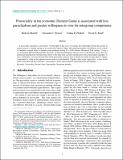Files in this item
Prosociality in the economic dictator game is associated with less parochialism and greater willingness to vote for intergroup compromise
Item metadata
| dc.contributor.author | Mosleh, Mohsen | |
| dc.contributor.author | Stewart, Alexander J. | |
| dc.contributor.author | Plotkin, Joshua B. | |
| dc.contributor.author | Rand, David G. | |
| dc.date.accessioned | 2021-03-25T11:30:02Z | |
| dc.date.available | 2021-03-25T11:30:02Z | |
| dc.date.issued | 2020-01-06 | |
| dc.identifier | 272144521 | |
| dc.identifier | bbe7b341-6deb-47ca-a745-8e8861ddb62e | |
| dc.identifier | 85079455204 | |
| dc.identifier.citation | Mosleh , M , Stewart , A J , Plotkin , J B & Rand , D G 2020 , ' Prosociality in the economic dictator game is associated with less parochialism and greater willingness to vote for intergroup compromise ' , Judgment and Decision Making , vol. 15 , no. 1 , pp. 1-6 . < http://journal.sjdm.org/19/190814/jdm190814.html > | en |
| dc.identifier.issn | 1930-2975 | |
| dc.identifier.other | ORCID: /0000-0001-5234-3871/work/86538501 | |
| dc.identifier.uri | https://hdl.handle.net/10023/21714 | |
| dc.description.abstract | Is prosociality parochial or universalist? To shed light on this issue, we examine the relationship between the amount of money given to a stranger (giving in an incentivized Dictator Game) and intergroup attitudes and behavior in the context of randomly assigned teams (a minimal group paradigm) among N = 4,846 Amazon Mechanical Turk workers. Using a set of Dynamic Identity Diffusion Index measures, we find that participants who give more in the Dictator Game show less preferential identification with their team relative to the other team, and more identification with all participants regardless of team. Furthermore, in an incentivized Voter Game, participants who give more in the Dictator Game are more likely to support compromise by voting for the opposing team in order to avoid deadlock. Together, these results suggest that – at least in this subject pool and using these measures – prosociality is better characterized by universalism than parochialism. | |
| dc.format.extent | 6 | |
| dc.format.extent | 450504 | |
| dc.language.iso | eng | |
| dc.relation.ispartof | Judgment and Decision Making | en |
| dc.subject | Dictator game | en |
| dc.subject | Ingroup bias | en |
| dc.subject | Intergroup attitudes | en |
| dc.subject | Prosociality | en |
| dc.subject | QA Mathematics | en |
| dc.subject | Decision Sciences(all) | en |
| dc.subject | Economics and Econometrics | en |
| dc.subject | Applied Psychology | en |
| dc.subject | T-NDAS | en |
| dc.subject.lcc | QA | en |
| dc.title | Prosociality in the economic dictator game is associated with less parochialism and greater willingness to vote for intergroup compromise | en |
| dc.type | Journal article | en |
| dc.contributor.institution | University of St Andrews. Applied Mathematics | en |
| dc.description.status | Peer reviewed | en |
| dc.identifier.url | http://journal.sjdm.org/19/190814/jdm190814.html | en |
This item appears in the following Collection(s)
Items in the St Andrews Research Repository are protected by copyright, with all rights reserved, unless otherwise indicated.

